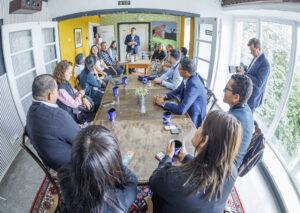OGP Local Deep Dives
OGP Local hosted a series of online sessions to explore how local governments can advance open government in five key themes and become more transparent, accountable, responsive, and inclusive.
Watch all the recordings and get inspired to take on the Open Gov Challenge.
- September 10 | Public participation
- September 18 | Gender and inclusion
- September 25 | Anti-corruption
- October 2 | Fiscal openness
- October 9 | Open data
September 10, 3:00-4:30 PM CEST | Public Participation
Public participation at the local level is essential to shape policies that reflect community needs. By involving residents in decision-making, local governments can gain valuable insights, build trust, and foster a shared sense of ownership. Transparent and inclusive processes can lead to better outcomes for everyone.
In this session, we explored strategies to promote public participation and make it a core component of decision-making.
September 18, 3:00-4:30 PM CEST | Gender and Inclusion
Local governments, through their public services, and protection and empowerment programs, are key in creating inclusive communities where everyone can thrive. Inclusive governance ensures diverse voices, including women and under-represented groups, are heard in decision-making. Transparent and inclusive local governments can promote that the needs of women and under-represented groups are also met.
In this session, we explored examples of inclusion through open government, demonstrating how it can strengthen democracy and promote social justice.
September 25, 3:00-4:30 PM CEST | Anti-corruption
Local governments play a crucial role in daily governance, they are closer to the people and can be more responsive to local needs. However, this proximity can also make them more susceptible to corruption risks. Addressing these risks requires a collaborative approach involving government officials, civil society organizations, the private sector, and citizens. By combating corruption effectively, local governments can preserve public trust, have effective service delivery, and improve the quality of life for all citizens.
In this session, we explored how local governments are tackling corruption and developing innovative solutions through open government approaches.
October 2, 3:00-4:30 PM CEST | Fiscal Openness
Citizens have the right to know and take part in how their governments collect and spend money. Opening up fiscal and spending processes can improve financial planning and efficiency, mitigate risks, and safeguard against corruption. This translates to a better use of public resources to meet citizen’s needs.
In this session, we explored how fiscal openness initiatives at the local level can empower communities to actively participate in shaping their local development priorities and ensuring fair resource allocation.
October 9, 3:00-4:30 PM CEST | Open Data
Local governments’ have access and collect large amounts of data in their communities which helps them better understand and address people’s needs. Many local governments are now using open data to boost transparency, accountability, and citizen engagement. Using open data smartly, can help governments make better decisions and more impactful policies.
In this session, we explored strategies, services, innovations related to open data and how they contribute to develop responsive solutions for communities.

